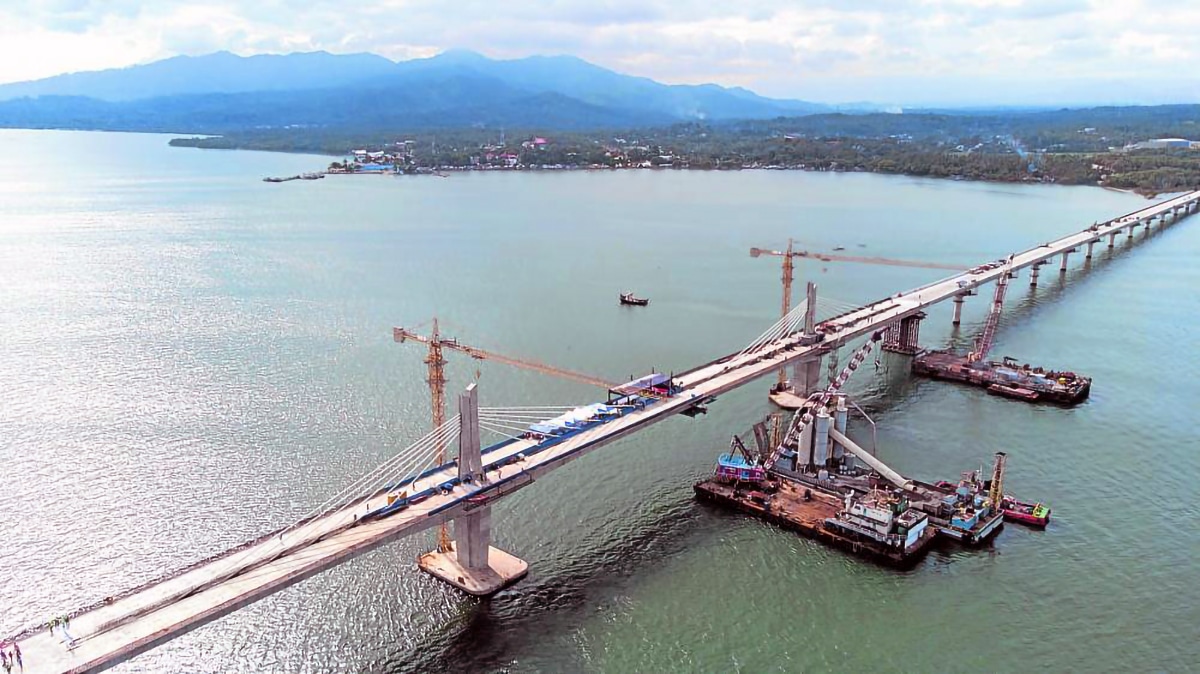
MILESTONE Public Works Secretary Manuel Bonoan says the completion of Panguil Bay Bridge is not only a construction milestone but also symbolizes the realization of a long-held dream of communities in the provinces of Lanao del Norte and Misamis Occidental. —photo courtesy of Lanao del Norte Provincial Information Office
ILIGAN CITY, LANAO DEL NORTE, Philippines — Lilia Cabahug, 68, who retired from the private sector, looks forward to the opening this year of the 3.17-kilometer Panguil Bay Bridge between Tubod, Lanao del Norte and Tangub City, Misamis Occidental, to boost her food business.
In the past 12 years, Cabahug said, she has been constrained by high logistics costs so she can sell cakes, pastries and pasta to customers in Misamis Occidental, which requires her to cross the bay via ferry that also has a long waiting time.
Michael Buhisan, 35, who is engaged in the printing business, also sees expansion of the market of his services if the bridge is finally opened.
Both Buhisan and Cabahug said they were thankful that President Ferdinand Marcos Jr. had committed during his State of the Nation Address (Sona) on Monday to complete the bridge project this year.
Mindanao Development Authority (MinDA) Chair Leo Tereso Magno said “big Mindanao projects” such as the Panguil Bay Bridge “exemplify the kind of infrastructure advancements that will significantly boost connectivity and economic activity in Mindanao.”
Apart from the bridge, Marcos also mentioned the Malitbog-Maridagao irrigation system in Cotabato province and the Guicam bridge project in Zamboanga Sibugay province among the big-ticket projects in his administration’s priorities.
“These initiatives are not just infrastructure improvements; they are lifelines that will link communities, open up markets, and enhance the quality of life for countless Mindanaoans,” Magno said in a statement.
“The emphasis on infrastructure development, economic recovery and social services resonates deeply with our mission in MinDA. [President Marcos’] commitment to enhancing connectivity, improving public services and fostering economic growth is crucial for the inclusive development of Mindanao and its people,” Magno added.
Concrete climate actions
Climate activists hail the President’s pronouncements about the issue of climate change, although they wanted to hear more concrete actions outlined.
“We welcome the President’s recognition of climate and energy as important issues for the Philippines, and the urgency for action in this year’s Sona,” said a statement from Angelo Kairos dela Cruz, executive director of the Institute for Climate and Sustainable Cities (ICSC), a nongovernment group advocating for climate, energy and low-carbon solutions to enable fair and climate-resilient development at the national and international levels.
ICSC, Dela Cruz said, hopes that the President’s pronouncement “signals a broader agreement that climate action is better development, and doing otherwise is not only counterintuitive but also detrimental to our collective development.”
Recognizing the adverse impact of climate change-induced extreme weather events in Mindanao, MinDA had set an ambitious target of reducing the region’s dependence on fossil fuel-fed capacities for its energy needs. By 2030, MinDA hopes to see renewable energy capacities comprising at least 50 percent of Mindanao’s energy mix.
Dela Cruz said efforts to help ease the payments of electric costs for consumers would only have the effect of a “Band-Aid solution” if there is “the continued prevalence” of fossil fuel-based power sources as these “can still drive up the cost of electricity and set back true progress.” —with reports from Richel V. Umel, Ryan D. Rosauro and Germelina Lacorte